Delphi Complete Works of Aeschylus (Illustrated) (Delphi Ancient Classics) Read online
The Complete Works of
AESCHYLUS
(525/524-456/455 BC)
Contents
The Translations
THE PERSIANS
SEVEN AGAINST THEBES
THE SUPPLIANTS
AGAMEMNON
THE LIBATION BEARERS
THE EUMENIDES
PROMETHEUS BOUND
FRAGMENTS
The Greek Texts
LIST OF GREEK TEXTS
The Biographies
INTRODUCTION TO AESCHYLUS by E. D. A. Morshead
AESCHYLUS by T. W. LUMB
© Delphi Classics 2013
Version 1
The Complete Works of
AESCHYLUS
By Delphi Classics, 2013
The Translations
Aeschylus is believed to have been born in Eleusis, a small town northwest of Athens, which is nestled in the fertile valleys of western Attica.
THE PERSIANS
Translated by E. D. A. Morshead
The earliest play by Aeschylus to survive was first performed in 472 BC, being based on experiences from the playwright’s own life, specifically drawing on his involvement in the Battle of Salamis. The Persians is unique among surviving Greek tragedies in describing a contemporary historical event, rather than a mythological story. The tragedy focuses on the popular Greek theme of hubris, exploring Persia’s loss of Empire through the pride of its Emperor.
The drama opens with the arrival of a messenger in Susa, the Persian capital, bearing news of the catastrophic Persian defeat at Salamis to Atossa, the mother of the Persian King Xerxes. Atossa then travels to the tomb of Darius, her husband, where his ghost appears to explain the cause of the defeat. It is, he says, the result of Xerxes’ hubris in building a bridge across the Hellespont, an action which angered the gods. Xerxes appears at the end of the play, not realising the cause of his defeat, and the play closes to lamentations by Xerxes and the chorus.
A depiction of Xerxes the Great (519–465 BC) from a palace at Persepolis
CONTENTS
ARGUMENT
DRAMATIS PERSONAE
THE PERSIANS
A bust of Aeschylus from the Capitoline Museum, Rome
In 480, Aeschylus was called into military service against Xerxes’ invading forces at the Battle of Salamis. This important battle holds a prominent place in ‘The Persians’, Aeschylus’ oldest surviving play, which was performed in 472 BC and won first prize at the Dionysia, the principal dramatic competition in Athens.
ARGUMENT
Xerxes, son of Darius and of his wife Atossa, daughter of Cyrus, went forth against Hellas, to take vengeance upon those who had defeated his father at Marathon. But ill fortune befell the king and his army both by land and sea; neither did it avail him that he cast a bridge over the Hellespont and made a canal across the promontory of Mount Athos, and brought myriads of men, by land and sea, to subdue the Greeks. For in the strait between Athens and the island of Salamis the Persian ships were shattered and sunk or put to flight by those of Athens and Lacedaemon and Aegina and Corinth, and Xerxes went homewards on the way by which he had come, leaving his general Mardonius with three hundred thousand men to strive with the Greeks by land: but in the next year they were destroyed near Plataea in Boeotia, by the Lacedaemonians and Athenians and Tegeans. Such was the end of the army which Xerxes left behind him. But the king himself had reached the bridge over the Hellespont, and late and hardly and in sorry plight and with few companions came home unto the Palace of Susa.
DRAMATIS PERSONAE
CHORUS OF PERSIAN ELDERS.
ATOSSA, WIDOW OF DARIUS AND MOTHER OF XERXES.
A MESSENGER.
THE GHOST OF DARIUS.
XERXES.
The Scene is laid at the Palace of Susa.
THE PERSIANS
CHORUS
Away unto the Grecian land
Hath passed the Persian armament:
We, by the monarch’s high command,
We are the warders true who stand,
Chosen, for honour and descent,
To watch the wealth of him who went —
Guards of the gold, and faithful styled
By Xerxes, great Darius’ child!
But the king went nor comes again —
And for that host, we saw depart
Arrayed in gold, my boding heart
Aches with a pulse of anxious pain,
Presageful for its youthful king!
No scout, no steed, no battle-car
Comes speeding hitherward, to bring
News to our city from afar!
Erewhile they went, away, away,
From Susa, from Ecbatana,
From Kissa’s timeworn fortress grey,
Passing to ravage and to war —
Some upon steeds, on galleys some,
Some in close files, they passed from home,
All upon warlike errand bent —
Amistres, Artaphernes went,
Astaspes, Megabazes high,
Lords of the Persian chivalry,
Marshals who serve the great king’s word
Chieftains of all the mighty horde!
Horsemen and bowmen streamed away,
Grim in their aspect, fixed to slay,
And resolute to face the fray!
With troops of horse, careering fast,
Masistes, Artembáres passed:
Imaeus too, the bowman brave,
Sosthánes, Pharandákes, drave —
And others the all-nursing wave
Of Nilus to the battle gave;
Came Susiskánes, warrior wild,
And Pegastágon, Egypt’s child:
Thee, brave Arsámes! from afar
Did holy Memphis launch to war;
And Ariomardus, high in fame,
From Thebes the immemorial came,
And oarsmen skilled from Nilus’ fen,
A countless crowd of warlike men:
And next, the dainty Lydians went —
Soft rulers of a continent —
Mitragathes and Arcteus bold
In twin command their ranks controlled,
And Sardis town, that teems with gold,
Sent forth its squadrons to the war —
Horse upon horse, and car on car,
Double and triple teams, they rolled,
In onset awful to behold.
From Tmolus’ sacred hill there came
The native hordes to join the fray,
And upon Hellas’ neck to lay
The yoke of slavery and shame;
Mardon and Tharubis were there,
Bright anvils for the foemen’s spear!
The Mysian dart-men sped to war,
And the long crowd that onward rolled
From Babylon enriched with gold —
Captains of ships and archers skilled
To speed the shaft, and those who wield
The scimitar; — the eastern band
Who, by the great king’s high command,
Swept to subdue the western land!
Gone are they, gone — ah, welladay!
The flower and pride of our array;
And all the Eastland, from whose breast
Came forth her bravest and her best,
Craves longingly with boding dread —
Parents for sons, and brides new-wed
For absent lords, and, day by day,
Shudder with dread at their delay!
Ere now they have passed o’er the sea,
the manifold ho
st of the king —
They have gone forth to sack and to burn;
ashore on the Westland they spring!
With cordage and rope they have bridged
the sea-way of Helle, to pass
O’er the strait that is named by thy name,
O daughter of Athamas!
They have anchored their ships in the current,
they have bridled the neck of the sea —
The Shepherd and Lord of the East
hath bidden a roadway to be!
From the land to the land they pass over,
a herd at the high king’s best;
Some by the way of the waves,
and some o’er the planking have pressed.
For the king is a lord and a god:
he was born of the golden seed
That erst upon Danae fell —
his captains are strong at the need!
And dark is the glare of his eyes,
as eyes of a serpent blood-fed,
And with manifold troops in his train
and with manifold ships hath he sped —
Yea, sped with his Syrian cars:
he leads on the lords of the bow
To meet with the men of the West,
the spear-armed force of the foe!
Can any make head and resist him,
when he comes with the roll of a wave?
No barrier nor phalanx of might,
no chief, be he ever so brave!
For stern is the onset of Persia,
and gallant her children in fight.
But the guile of the god is deceitful,
and who shall elude him by flight?
And who is the lord of the leap,
that can spring and alight and evade?
For Até deludes and allures,
till round him the meshes are laid,
And no man his doom can escape!
it was writ in the rule of high Heaven,
That in tramp of the steeds and in crash of the charge
the war-cry of Persia be given:
They have learned to behold the forbidden,
the sacred enclosure of sea,
Where the waters are wide and in stress
of the wind the billows roll hoary to lee!
And their trust is in cable and cordage,
too weak in the power of the blast,
And frail are the links of the bridge
whereby unto Hellas they passed.
Therefore my gloom-wrapped heart
is rent with sorrow
For what may hap to-morrow!
Alack, for all the Persian armament —
Alack, lest there be sent
Dread news of desolation, Susa’s land
Bereft, forlorn, unmanned —
Lest the grey Kissian fortress echo back
The wail, Alack, Alack!
The sound of women’s shriek, who wail and mourn,
With fine-spun raiment torn!
The charioteers went forth nor come again,
And all the marching men
Even as a swarm of bees have flown afar,
Drawn by the king to war —
Crossing the sea-bridge, linked from side to side,
That doth the waves divide:
And the soft bridal couch of bygone years
Is now bedewed with tears,
Each princess, clad in garments delicate,
Wails for her widowed fate —
Alas my gallant bridegroom, lost and gone,
And I am left alone!
But now, ye warders of the state,
Here, in this hall of old renown,
Behoves that we deliberate
In counsel deep and wise debate,
For need is surely shown!
How fareth he, Darius’ child,
The Persian king, from Perseus styled?
Comes triumph to the eastern bow,
Or hath the lance-point conquered now?
[Enter ATOSSA.
See, yonder comes the mother-queen,
Light of our eyes, in godlike sheen,
The royal mother of the king! —
Fall we before her! well it were
That, all as one, we sue to her,
And round her footsteps cling!
Queen, among deep-girded Persian dames thou highest and most royal,
Hoary mother, thou, of Xerxes, and Darius’ wife of old!
To godlike sire, and godlike son, we bow us and are loyal —
Unless, on us, an adverse tide of destiny has rolled!
ATOSSA
Therefore come I forth to you, from chambers decked and golden,
Where long ago Darius laid his head, with me beside,
And my heart is torn with anguish, and with terror am I holden,
And I plead unto your friendship and I bid you to my side.
Darius, in the old time, by aid of some Immortal,
Raised up the stately fabric, our wealth of long-ago:
But I tremble lest it totter down, and ruin porch and portal,
And the whirling dust of downfall rise above its overthrow!
Therefore a dread unspeakable within me never slumbers, Saying,
Honour not the gauds of wealth if men have ceased to grow,
Nor deem that men, apart from wealth,
can find their strength in numbers —
We shudder for our light and king, though we have gold enow!
No light there is, in any house, save presence of the master —
So runs the saw, ye aged men! and truth it says indeed —
On you I call, the wise and true, to ward us from disaster,
For all my hope is fixed on you, to prop us in our need!
CHORUS
Queen-Mother of the Persian land, to thy commandment bowing,
Whate’er thou wilt, in word or deed, we follow to fulfil —
Not twice we need thine high behest, our faith and duty knowing,
In council and in act alike, thy loyal servants still!
ATOSSA
Long while by various visions of the night
Am I beset, since to Ionian lands
With marshalled host my son went forth to war.
Yet never saw I presage so distinct
As in the night now passed. — Attend my tale! —
A dream I had: two women nobly clad
Came to my sight, one robed in Persian dress,
The other vested in the Dorian garb,
And both right stately and more tall by far
Than women of to-day, and beautiful
Beyond disparagement, and sisters sprung
Both of one race, but, by their natal lot,
One born in Hellas, one in Eastern land.
These, as it seemed unto my watching eyes,
Roused each the other to a mutual feud:
The which my son perceiving set himself
To check and soothe their struggle, and anon
Yoked them and set the collars on their necks;
And one, the Ionian, proud in this array,
Paced in high quietude, and lent her mouth,
Obedient, to the guidance of the rein.
But restively the other strove, and broke
The fittings of the car, and plunged away
With mouth un-bitted: o’er the broken yoke
My son was hurled, and lo! Darius stood
In lamentation o’er his fallen child.
Him Xerxes saw, and rent his robe in grief.
Such was my vision of the night now past;
But when, arising, I had dipped my hand
In the fair lustral stream, I drew towards
The altar, in the act of sacrifice,
Having in mind to offer, as their due,
The sacred meal-cake to the averting powers,
Lords of the rite that banisheth ill dreams.
When lo! I saw an eagle fleeing fast
To Phoebus’ shrine — O friends
, I stayed my steps,
Too scared to speak! for, close upon his flight,
A little falcon dashed in winged pursuit,
Plucking with claws the eagle’s head, while he
Could only crouch and cower and yield himself.
Scared was I by that sight, and eke to you
No less a terror must it be to hear!
For mark this well — if Xerxes have prevailed,
He shall come back the wonder of the world:
If not, still none can call him to account —
So he but live, he liveth Persia’s King!
CHORUS
Queen, it stands not with my purpose to abet these fears of thine,
Nor to speak with glazing comfort! nay, betake thee to the shrine!
If thy dream foretold disaster, sue to gods to bar its way,
And, for thyself, son, state, and friends, to bring fair fate
to-day.
Next, unto Earth and to the Dead be due libation poured,
And by thee let Darius’ soul be wistfully implored —
I saw thee, lord, in last night’s dream, a phantom from the grave,
I pray thee, lord, from earth beneath come forth to help and save!
To me and to thy son send up the bliss of triumph now,
And hold the gloomy fates of ill, dim in the dark below!
Such be thy words! my inner heart good tidings doth foretell,
And that fair fate will spring thereof, if wisdom guide us well.
ATOSSA
Loyal thou that first hast read this dream, this vision of the
night,
With loyalty to me, the queen — be then thy presage right!
And therefore, as thy bidding is, what time I pass within
To dedicate these offerings, new prayers I will begin,
Alike to gods and the great dead who loved our lineage well.
Yet one more word — say, in what realm do the Athenians dwell?
CHORUS
Far hence, even where, in evening land, goes down our Lord the Sun.
ATOSSA
Say, had my son so keen desire, that region to o’errun?
CHORUS
Yea — if she fell, the rest of Greece were subject to our sway!
ATOSSA
Hath she so great predominance, such legions in array?
CHORUS
Ay — such a host as smote us sore upon an earlier day.
ATOSSA
And what hath she, besides her men? enow of wealth in store?

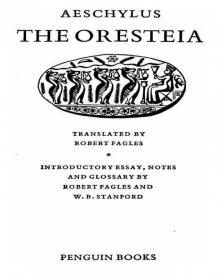 The Oresteia: Agamemnon, the Libation Bearers, the Eumenides
The Oresteia: Agamemnon, the Libation Bearers, the Eumenides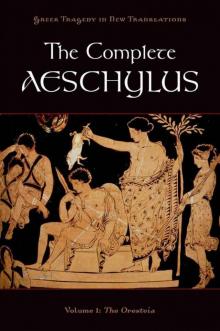 The Complete Aeschylus, Volume I: The Oresteia
The Complete Aeschylus, Volume I: The Oresteia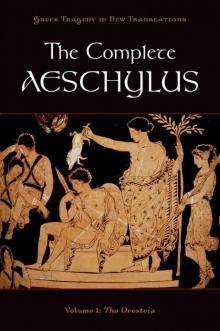 The Complete Aeschylus - Volume I: The Oresteia
The Complete Aeschylus - Volume I: The Oresteia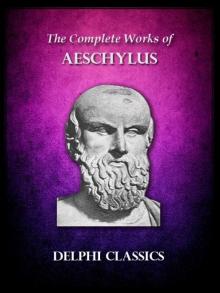 Delphi Complete Works of Aeschylus (Illustrated) (Delphi Ancient Classics)
Delphi Complete Works of Aeschylus (Illustrated) (Delphi Ancient Classics)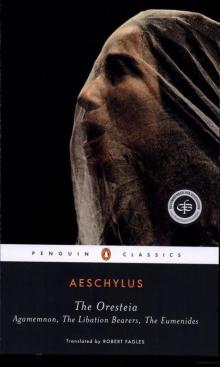 The Oresteia: Agamemnon, the Libation-Bearers & the Furies
The Oresteia: Agamemnon, the Libation-Bearers & the Furies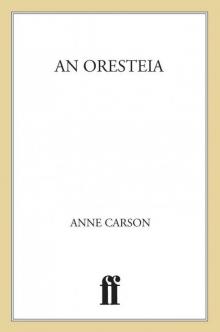 An Oresteia: Agamemnon by Aiskhylos; Elektra by Sophokles; Orestes by Euripides
An Oresteia: Agamemnon by Aiskhylos; Elektra by Sophokles; Orestes by Euripides